Operation Functions and Market Support: A Case Study of Aston Martin
VerifiedAdded on 2023/06/12
|8
|2578
|296
AI Summary
This report discusses the role of operation, supply chain and logistic management in improving the productivity and efficiency of business by managing the overall functions of business. It also highlights the challenges faced by Aston Martin's operation and supply chain managers and how they are overcoming them. The report concludes by emphasizing the importance of improving the quality of cars and building effective relations with supply chains to attract maximum number of car users towards the brand.
Contribute Materials
Your contribution can guide someone’s learning journey. Share your
documents today.
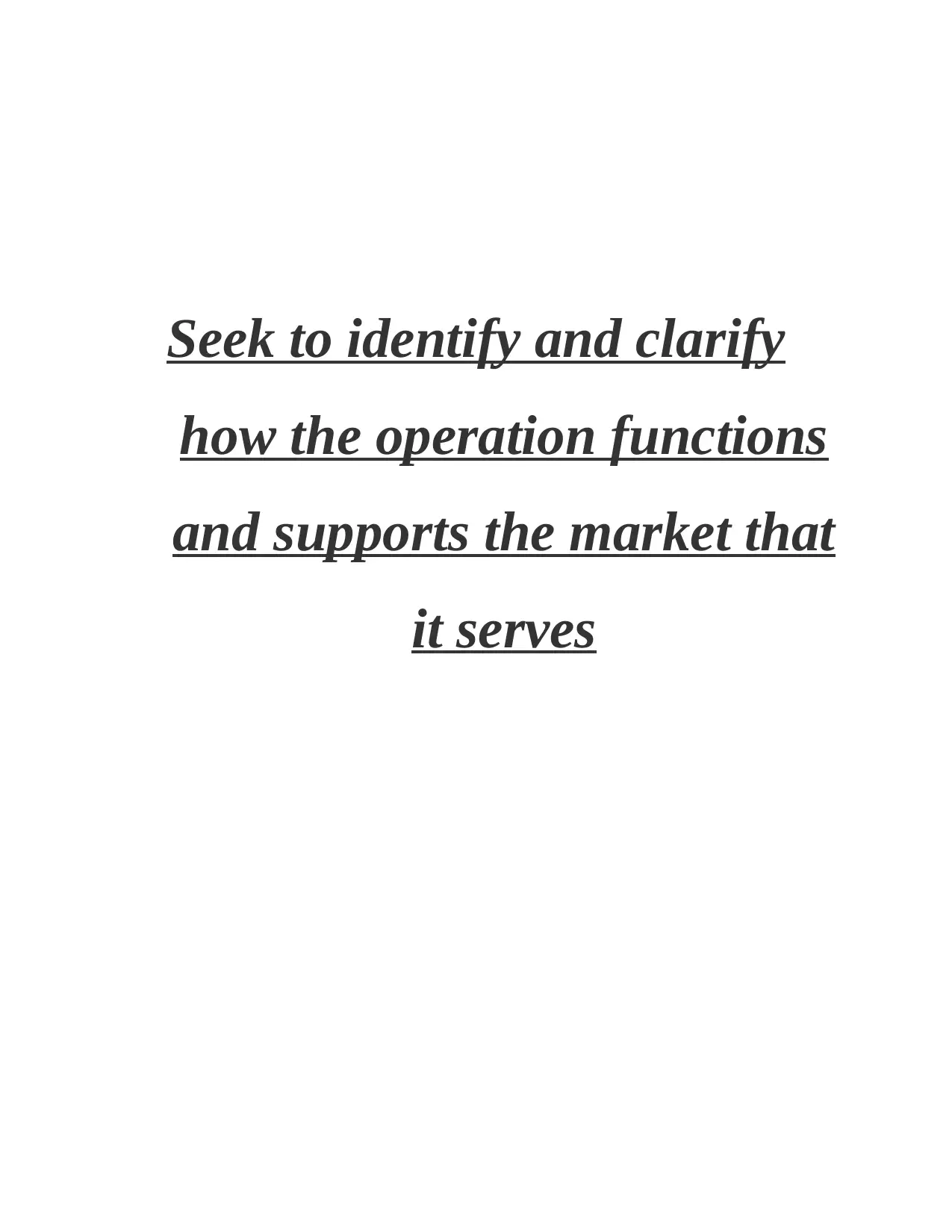
Seek to identify and clarify
how the operation functions
and supports the market that
it serves
how the operation functions
and supports the market that
it serves
Secure Best Marks with AI Grader
Need help grading? Try our AI Grader for instant feedback on your assignments.

Table of Contents
INTRODUCTION...........................................................................................................................3
INDIVIDUAL ESSAY....................................................................................................................3
CONCLUSION................................................................................................................................7
REFERENCES................................................................................................................................8
INTRODUCTION...........................................................................................................................3
INDIVIDUAL ESSAY....................................................................................................................3
CONCLUSION................................................................................................................................7
REFERENCES................................................................................................................................8
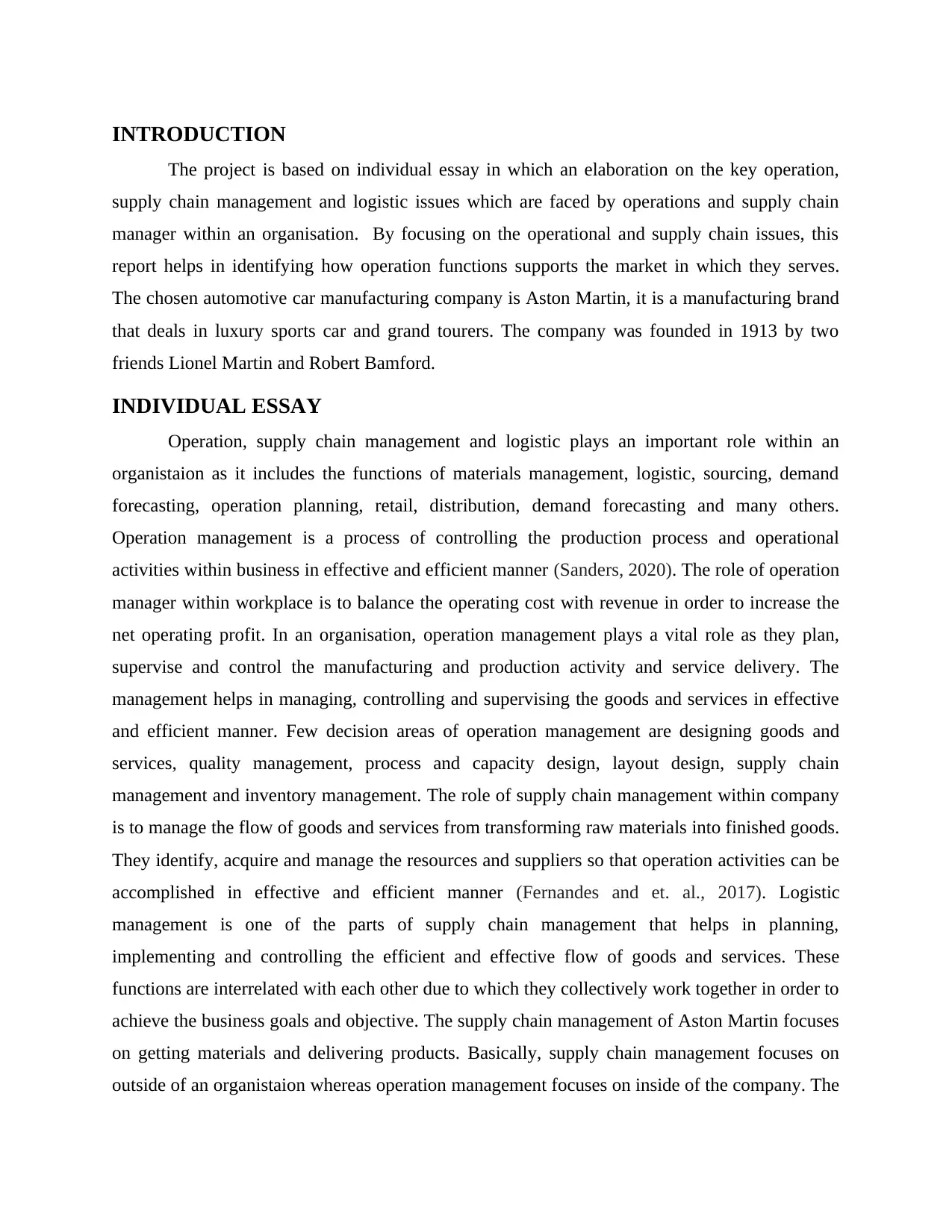
INTRODUCTION
The project is based on individual essay in which an elaboration on the key operation,
supply chain management and logistic issues which are faced by operations and supply chain
manager within an organisation. By focusing on the operational and supply chain issues, this
report helps in identifying how operation functions supports the market in which they serves.
The chosen automotive car manufacturing company is Aston Martin, it is a manufacturing brand
that deals in luxury sports car and grand tourers. The company was founded in 1913 by two
friends Lionel Martin and Robert Bamford.
INDIVIDUAL ESSAY
Operation, supply chain management and logistic plays an important role within an
organistaion as it includes the functions of materials management, logistic, sourcing, demand
forecasting, operation planning, retail, distribution, demand forecasting and many others.
Operation management is a process of controlling the production process and operational
activities within business in effective and efficient manner (Sanders, 2020). The role of operation
manager within workplace is to balance the operating cost with revenue in order to increase the
net operating profit. In an organisation, operation management plays a vital role as they plan,
supervise and control the manufacturing and production activity and service delivery. The
management helps in managing, controlling and supervising the goods and services in effective
and efficient manner. Few decision areas of operation management are designing goods and
services, quality management, process and capacity design, layout design, supply chain
management and inventory management. The role of supply chain management within company
is to manage the flow of goods and services from transforming raw materials into finished goods.
They identify, acquire and manage the resources and suppliers so that operation activities can be
accomplished in effective and efficient manner (Fernandes and et. al., 2017). Logistic
management is one of the parts of supply chain management that helps in planning,
implementing and controlling the efficient and effective flow of goods and services. These
functions are interrelated with each other due to which they collectively work together in order to
achieve the business goals and objective. The supply chain management of Aston Martin focuses
on getting materials and delivering products. Basically, supply chain management focuses on
outside of an organistaion whereas operation management focuses on inside of the company. The
The project is based on individual essay in which an elaboration on the key operation,
supply chain management and logistic issues which are faced by operations and supply chain
manager within an organisation. By focusing on the operational and supply chain issues, this
report helps in identifying how operation functions supports the market in which they serves.
The chosen automotive car manufacturing company is Aston Martin, it is a manufacturing brand
that deals in luxury sports car and grand tourers. The company was founded in 1913 by two
friends Lionel Martin and Robert Bamford.
INDIVIDUAL ESSAY
Operation, supply chain management and logistic plays an important role within an
organistaion as it includes the functions of materials management, logistic, sourcing, demand
forecasting, operation planning, retail, distribution, demand forecasting and many others.
Operation management is a process of controlling the production process and operational
activities within business in effective and efficient manner (Sanders, 2020). The role of operation
manager within workplace is to balance the operating cost with revenue in order to increase the
net operating profit. In an organisation, operation management plays a vital role as they plan,
supervise and control the manufacturing and production activity and service delivery. The
management helps in managing, controlling and supervising the goods and services in effective
and efficient manner. Few decision areas of operation management are designing goods and
services, quality management, process and capacity design, layout design, supply chain
management and inventory management. The role of supply chain management within company
is to manage the flow of goods and services from transforming raw materials into finished goods.
They identify, acquire and manage the resources and suppliers so that operation activities can be
accomplished in effective and efficient manner (Fernandes and et. al., 2017). Logistic
management is one of the parts of supply chain management that helps in planning,
implementing and controlling the efficient and effective flow of goods and services. These
functions are interrelated with each other due to which they collectively work together in order to
achieve the business goals and objective. The supply chain management of Aston Martin focuses
on getting materials and delivering products. Basically, supply chain management focuses on
outside of an organistaion whereas operation management focuses on inside of the company. The
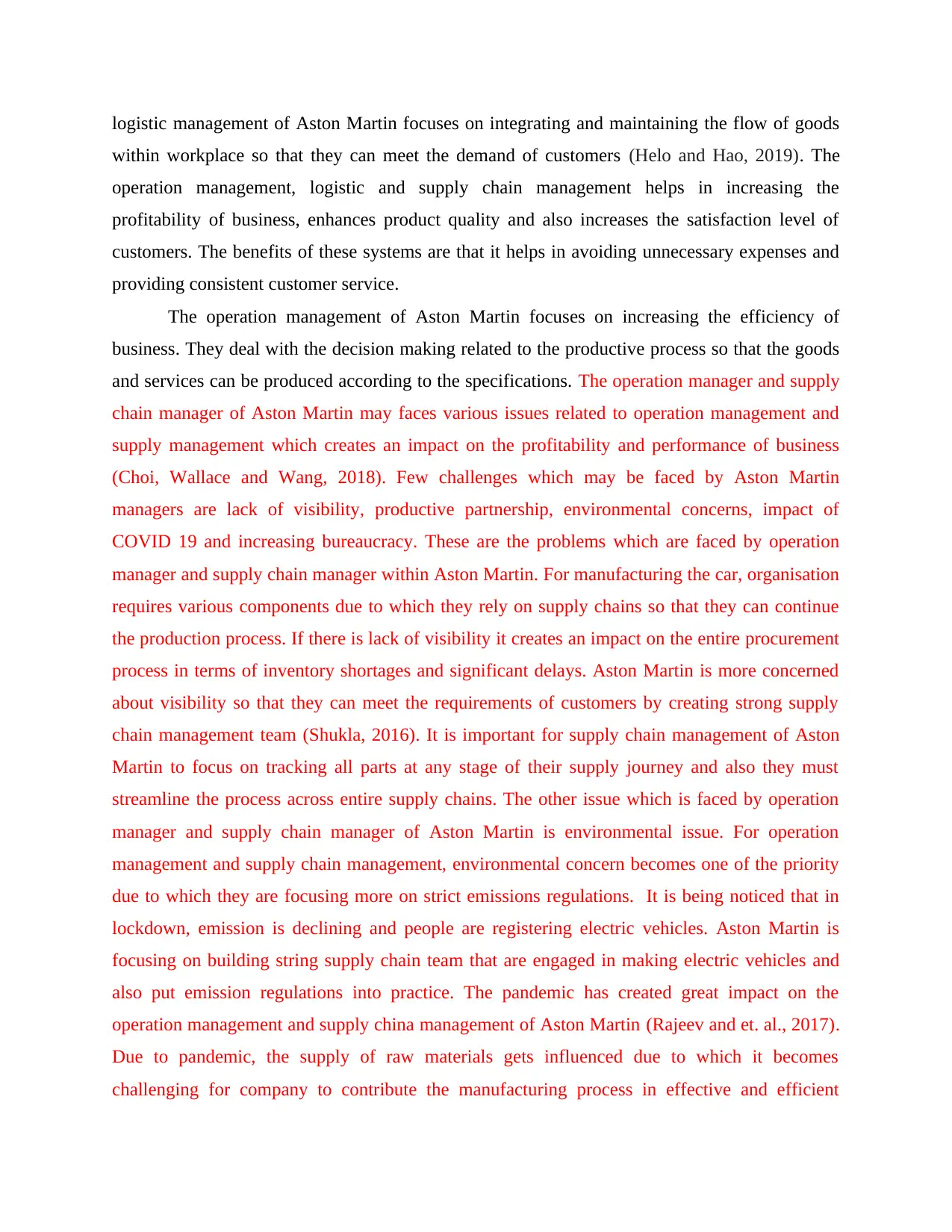
logistic management of Aston Martin focuses on integrating and maintaining the flow of goods
within workplace so that they can meet the demand of customers (Helo and Hao, 2019). The
operation management, logistic and supply chain management helps in increasing the
profitability of business, enhances product quality and also increases the satisfaction level of
customers. The benefits of these systems are that it helps in avoiding unnecessary expenses and
providing consistent customer service.
The operation management of Aston Martin focuses on increasing the efficiency of
business. They deal with the decision making related to the productive process so that the goods
and services can be produced according to the specifications. The operation manager and supply
chain manager of Aston Martin may faces various issues related to operation management and
supply management which creates an impact on the profitability and performance of business
(Choi, Wallace and Wang, 2018). Few challenges which may be faced by Aston Martin
managers are lack of visibility, productive partnership, environmental concerns, impact of
COVID 19 and increasing bureaucracy. These are the problems which are faced by operation
manager and supply chain manager within Aston Martin. For manufacturing the car, organisation
requires various components due to which they rely on supply chains so that they can continue
the production process. If there is lack of visibility it creates an impact on the entire procurement
process in terms of inventory shortages and significant delays. Aston Martin is more concerned
about visibility so that they can meet the requirements of customers by creating strong supply
chain management team (Shukla, 2016). It is important for supply chain management of Aston
Martin to focus on tracking all parts at any stage of their supply journey and also they must
streamline the process across entire supply chains. The other issue which is faced by operation
manager and supply chain manager of Aston Martin is environmental issue. For operation
management and supply chain management, environmental concern becomes one of the priority
due to which they are focusing more on strict emissions regulations. It is being noticed that in
lockdown, emission is declining and people are registering electric vehicles. Aston Martin is
focusing on building string supply chain team that are engaged in making electric vehicles and
also put emission regulations into practice. The pandemic has created great impact on the
operation management and supply china management of Aston Martin (Rajeev and et. al., 2017).
Due to pandemic, the supply of raw materials gets influenced due to which it becomes
challenging for company to contribute the manufacturing process in effective and efficient
within workplace so that they can meet the demand of customers (Helo and Hao, 2019). The
operation management, logistic and supply chain management helps in increasing the
profitability of business, enhances product quality and also increases the satisfaction level of
customers. The benefits of these systems are that it helps in avoiding unnecessary expenses and
providing consistent customer service.
The operation management of Aston Martin focuses on increasing the efficiency of
business. They deal with the decision making related to the productive process so that the goods
and services can be produced according to the specifications. The operation manager and supply
chain manager of Aston Martin may faces various issues related to operation management and
supply management which creates an impact on the profitability and performance of business
(Choi, Wallace and Wang, 2018). Few challenges which may be faced by Aston Martin
managers are lack of visibility, productive partnership, environmental concerns, impact of
COVID 19 and increasing bureaucracy. These are the problems which are faced by operation
manager and supply chain manager within Aston Martin. For manufacturing the car, organisation
requires various components due to which they rely on supply chains so that they can continue
the production process. If there is lack of visibility it creates an impact on the entire procurement
process in terms of inventory shortages and significant delays. Aston Martin is more concerned
about visibility so that they can meet the requirements of customers by creating strong supply
chain management team (Shukla, 2016). It is important for supply chain management of Aston
Martin to focus on tracking all parts at any stage of their supply journey and also they must
streamline the process across entire supply chains. The other issue which is faced by operation
manager and supply chain manager of Aston Martin is environmental issue. For operation
management and supply chain management, environmental concern becomes one of the priority
due to which they are focusing more on strict emissions regulations. It is being noticed that in
lockdown, emission is declining and people are registering electric vehicles. Aston Martin is
focusing on building string supply chain team that are engaged in making electric vehicles and
also put emission regulations into practice. The pandemic has created great impact on the
operation management and supply china management of Aston Martin (Rajeev and et. al., 2017).
Due to pandemic, the supply of raw materials gets influenced due to which it becomes
challenging for company to contribute the manufacturing process in effective and efficient
Secure Best Marks with AI Grader
Need help grading? Try our AI Grader for instant feedback on your assignments.
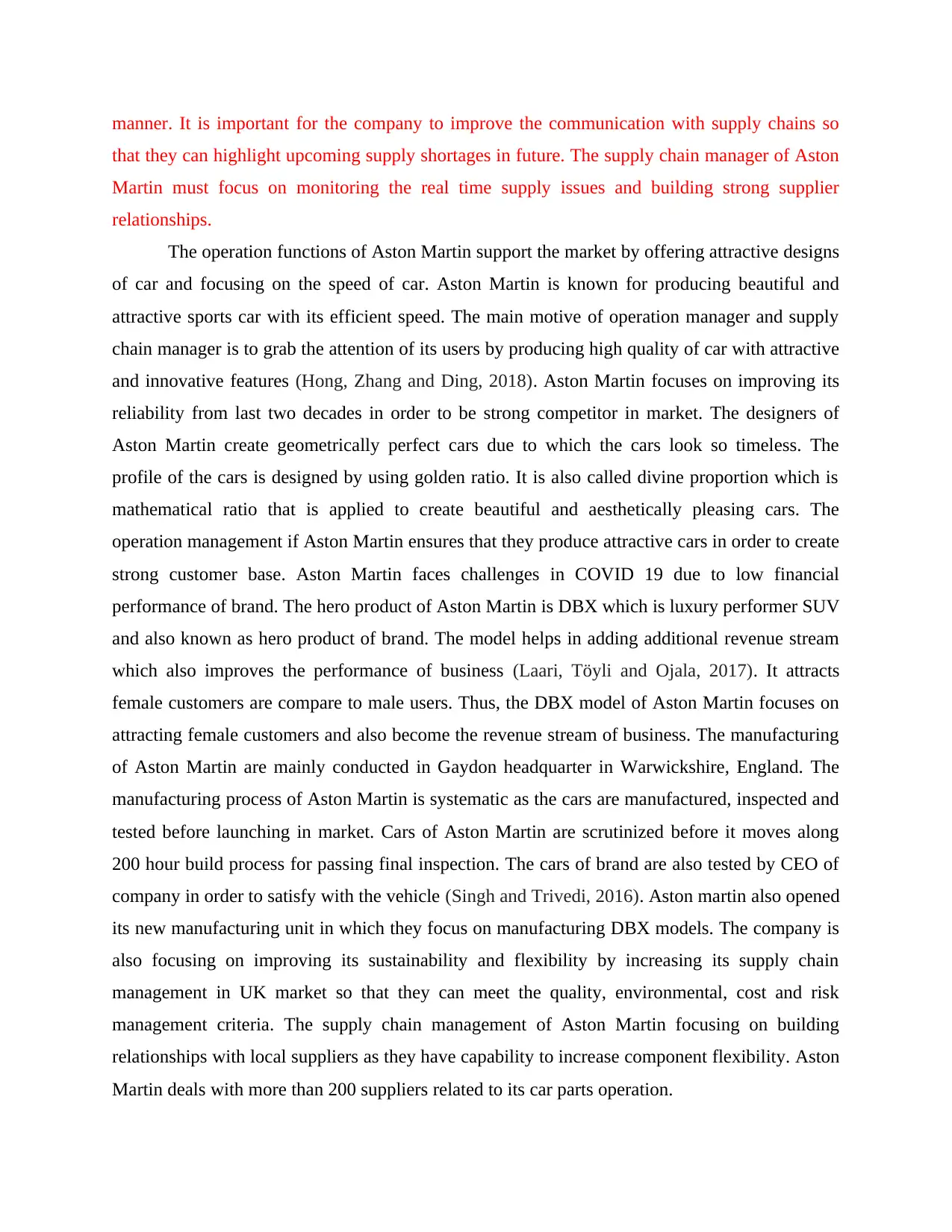
manner. It is important for the company to improve the communication with supply chains so
that they can highlight upcoming supply shortages in future. The supply chain manager of Aston
Martin must focus on monitoring the real time supply issues and building strong supplier
relationships.
The operation functions of Aston Martin support the market by offering attractive designs
of car and focusing on the speed of car. Aston Martin is known for producing beautiful and
attractive sports car with its efficient speed. The main motive of operation manager and supply
chain manager is to grab the attention of its users by producing high quality of car with attractive
and innovative features (Hong, Zhang and Ding, 2018). Aston Martin focuses on improving its
reliability from last two decades in order to be strong competitor in market. The designers of
Aston Martin create geometrically perfect cars due to which the cars look so timeless. The
profile of the cars is designed by using golden ratio. It is also called divine proportion which is
mathematical ratio that is applied to create beautiful and aesthetically pleasing cars. The
operation management if Aston Martin ensures that they produce attractive cars in order to create
strong customer base. Aston Martin faces challenges in COVID 19 due to low financial
performance of brand. The hero product of Aston Martin is DBX which is luxury performer SUV
and also known as hero product of brand. The model helps in adding additional revenue stream
which also improves the performance of business (Laari, Töyli and Ojala, 2017). It attracts
female customers are compare to male users. Thus, the DBX model of Aston Martin focuses on
attracting female customers and also become the revenue stream of business. The manufacturing
of Aston Martin are mainly conducted in Gaydon headquarter in Warwickshire, England. The
manufacturing process of Aston Martin is systematic as the cars are manufactured, inspected and
tested before launching in market. Cars of Aston Martin are scrutinized before it moves along
200 hour build process for passing final inspection. The cars of brand are also tested by CEO of
company in order to satisfy with the vehicle (Singh and Trivedi, 2016). Aston martin also opened
its new manufacturing unit in which they focus on manufacturing DBX models. The company is
also focusing on improving its sustainability and flexibility by increasing its supply chain
management in UK market so that they can meet the quality, environmental, cost and risk
management criteria. The supply chain management of Aston Martin focusing on building
relationships with local suppliers as they have capability to increase component flexibility. Aston
Martin deals with more than 200 suppliers related to its car parts operation.
that they can highlight upcoming supply shortages in future. The supply chain manager of Aston
Martin must focus on monitoring the real time supply issues and building strong supplier
relationships.
The operation functions of Aston Martin support the market by offering attractive designs
of car and focusing on the speed of car. Aston Martin is known for producing beautiful and
attractive sports car with its efficient speed. The main motive of operation manager and supply
chain manager is to grab the attention of its users by producing high quality of car with attractive
and innovative features (Hong, Zhang and Ding, 2018). Aston Martin focuses on improving its
reliability from last two decades in order to be strong competitor in market. The designers of
Aston Martin create geometrically perfect cars due to which the cars look so timeless. The
profile of the cars is designed by using golden ratio. It is also called divine proportion which is
mathematical ratio that is applied to create beautiful and aesthetically pleasing cars. The
operation management if Aston Martin ensures that they produce attractive cars in order to create
strong customer base. Aston Martin faces challenges in COVID 19 due to low financial
performance of brand. The hero product of Aston Martin is DBX which is luxury performer SUV
and also known as hero product of brand. The model helps in adding additional revenue stream
which also improves the performance of business (Laari, Töyli and Ojala, 2017). It attracts
female customers are compare to male users. Thus, the DBX model of Aston Martin focuses on
attracting female customers and also become the revenue stream of business. The manufacturing
of Aston Martin are mainly conducted in Gaydon headquarter in Warwickshire, England. The
manufacturing process of Aston Martin is systematic as the cars are manufactured, inspected and
tested before launching in market. Cars of Aston Martin are scrutinized before it moves along
200 hour build process for passing final inspection. The cars of brand are also tested by CEO of
company in order to satisfy with the vehicle (Singh and Trivedi, 2016). Aston martin also opened
its new manufacturing unit in which they focus on manufacturing DBX models. The company is
also focusing on improving its sustainability and flexibility by increasing its supply chain
management in UK market so that they can meet the quality, environmental, cost and risk
management criteria. The supply chain management of Aston Martin focusing on building
relationships with local suppliers as they have capability to increase component flexibility. Aston
Martin deals with more than 200 suppliers related to its car parts operation.
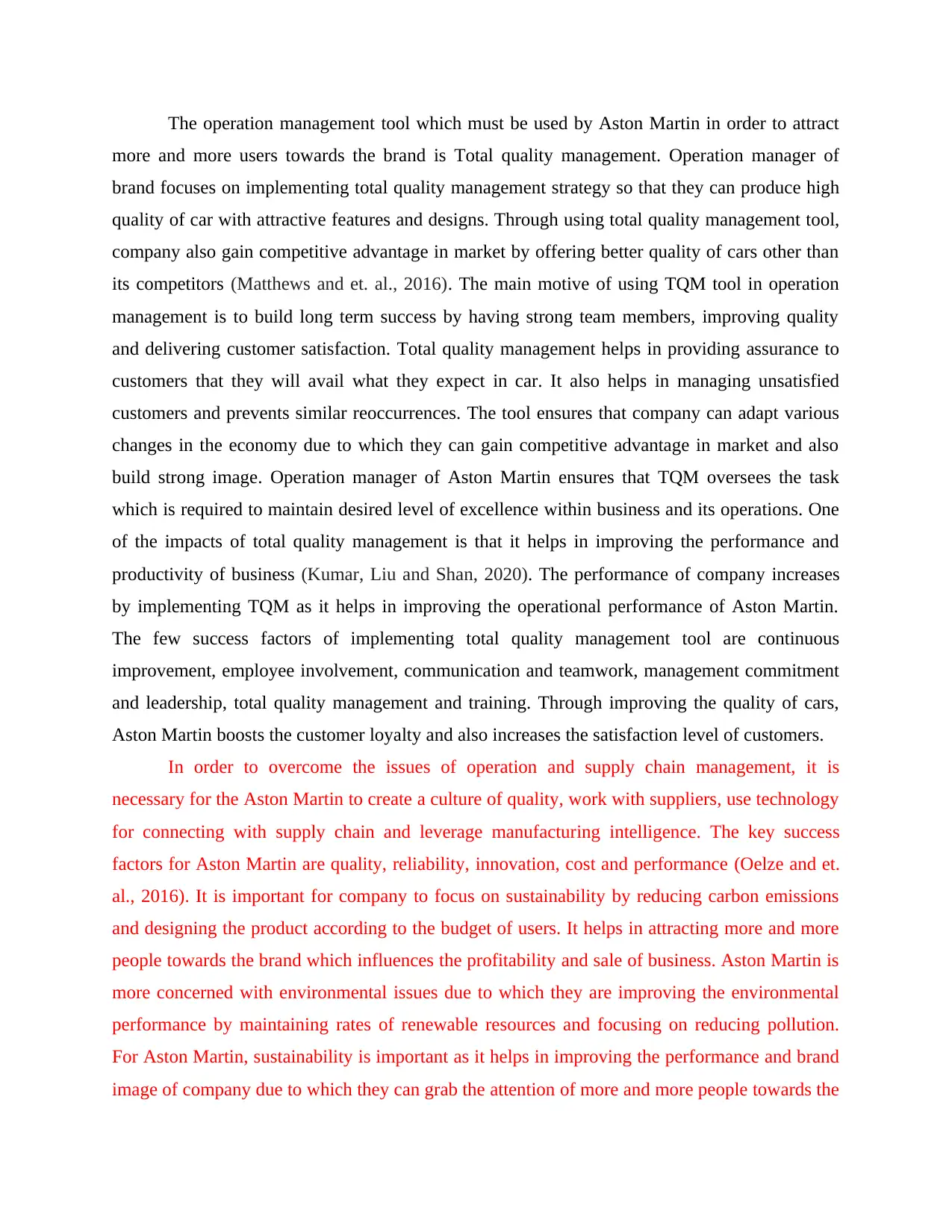
The operation management tool which must be used by Aston Martin in order to attract
more and more users towards the brand is Total quality management. Operation manager of
brand focuses on implementing total quality management strategy so that they can produce high
quality of car with attractive features and designs. Through using total quality management tool,
company also gain competitive advantage in market by offering better quality of cars other than
its competitors (Matthews and et. al., 2016). The main motive of using TQM tool in operation
management is to build long term success by having strong team members, improving quality
and delivering customer satisfaction. Total quality management helps in providing assurance to
customers that they will avail what they expect in car. It also helps in managing unsatisfied
customers and prevents similar reoccurrences. The tool ensures that company can adapt various
changes in the economy due to which they can gain competitive advantage in market and also
build strong image. Operation manager of Aston Martin ensures that TQM oversees the task
which is required to maintain desired level of excellence within business and its operations. One
of the impacts of total quality management is that it helps in improving the performance and
productivity of business (Kumar, Liu and Shan, 2020). The performance of company increases
by implementing TQM as it helps in improving the operational performance of Aston Martin.
The few success factors of implementing total quality management tool are continuous
improvement, employee involvement, communication and teamwork, management commitment
and leadership, total quality management and training. Through improving the quality of cars,
Aston Martin boosts the customer loyalty and also increases the satisfaction level of customers.
In order to overcome the issues of operation and supply chain management, it is
necessary for the Aston Martin to create a culture of quality, work with suppliers, use technology
for connecting with supply chain and leverage manufacturing intelligence. The key success
factors for Aston Martin are quality, reliability, innovation, cost and performance (Oelze and et.
al., 2016). It is important for company to focus on sustainability by reducing carbon emissions
and designing the product according to the budget of users. It helps in attracting more and more
people towards the brand which influences the profitability and sale of business. Aston Martin is
more concerned with environmental issues due to which they are improving the environmental
performance by maintaining rates of renewable resources and focusing on reducing pollution.
For Aston Martin, sustainability is important as it helps in improving the performance and brand
image of company due to which they can grab the attention of more and more people towards the
more and more users towards the brand is Total quality management. Operation manager of
brand focuses on implementing total quality management strategy so that they can produce high
quality of car with attractive features and designs. Through using total quality management tool,
company also gain competitive advantage in market by offering better quality of cars other than
its competitors (Matthews and et. al., 2016). The main motive of using TQM tool in operation
management is to build long term success by having strong team members, improving quality
and delivering customer satisfaction. Total quality management helps in providing assurance to
customers that they will avail what they expect in car. It also helps in managing unsatisfied
customers and prevents similar reoccurrences. The tool ensures that company can adapt various
changes in the economy due to which they can gain competitive advantage in market and also
build strong image. Operation manager of Aston Martin ensures that TQM oversees the task
which is required to maintain desired level of excellence within business and its operations. One
of the impacts of total quality management is that it helps in improving the performance and
productivity of business (Kumar, Liu and Shan, 2020). The performance of company increases
by implementing TQM as it helps in improving the operational performance of Aston Martin.
The few success factors of implementing total quality management tool are continuous
improvement, employee involvement, communication and teamwork, management commitment
and leadership, total quality management and training. Through improving the quality of cars,
Aston Martin boosts the customer loyalty and also increases the satisfaction level of customers.
In order to overcome the issues of operation and supply chain management, it is
necessary for the Aston Martin to create a culture of quality, work with suppliers, use technology
for connecting with supply chain and leverage manufacturing intelligence. The key success
factors for Aston Martin are quality, reliability, innovation, cost and performance (Oelze and et.
al., 2016). It is important for company to focus on sustainability by reducing carbon emissions
and designing the product according to the budget of users. It helps in attracting more and more
people towards the brand which influences the profitability and sale of business. Aston Martin is
more concerned with environmental issues due to which they are improving the environmental
performance by maintaining rates of renewable resources and focusing on reducing pollution.
For Aston Martin, sustainability is important as it helps in improving the performance and brand
image of company due to which they can grab the attention of more and more people towards the
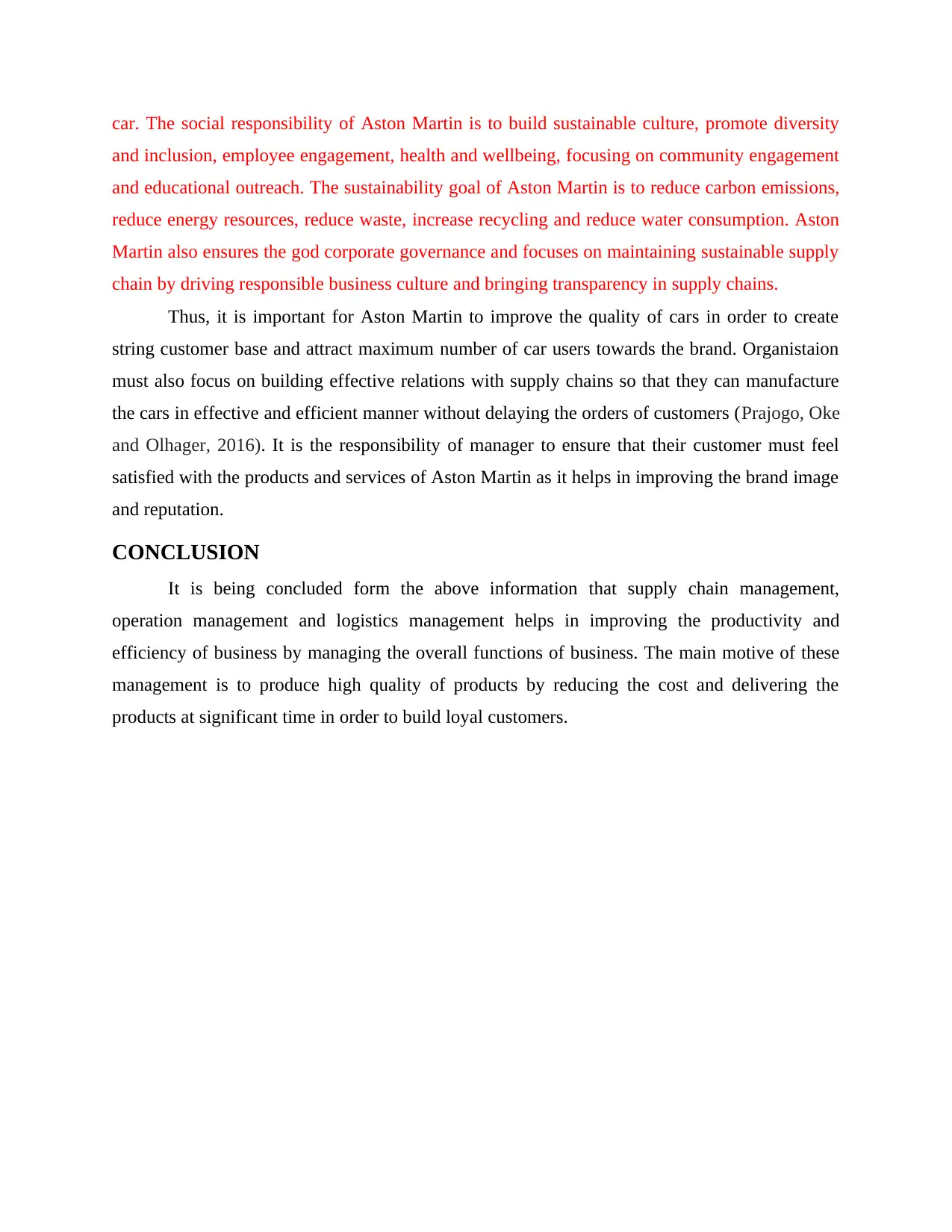
car. The social responsibility of Aston Martin is to build sustainable culture, promote diversity
and inclusion, employee engagement, health and wellbeing, focusing on community engagement
and educational outreach. The sustainability goal of Aston Martin is to reduce carbon emissions,
reduce energy resources, reduce waste, increase recycling and reduce water consumption. Aston
Martin also ensures the god corporate governance and focuses on maintaining sustainable supply
chain by driving responsible business culture and bringing transparency in supply chains.
Thus, it is important for Aston Martin to improve the quality of cars in order to create
string customer base and attract maximum number of car users towards the brand. Organistaion
must also focus on building effective relations with supply chains so that they can manufacture
the cars in effective and efficient manner without delaying the orders of customers (Prajogo, Oke
and Olhager, 2016). It is the responsibility of manager to ensure that their customer must feel
satisfied with the products and services of Aston Martin as it helps in improving the brand image
and reputation.
CONCLUSION
It is being concluded form the above information that supply chain management,
operation management and logistics management helps in improving the productivity and
efficiency of business by managing the overall functions of business. The main motive of these
management is to produce high quality of products by reducing the cost and delivering the
products at significant time in order to build loyal customers.
and inclusion, employee engagement, health and wellbeing, focusing on community engagement
and educational outreach. The sustainability goal of Aston Martin is to reduce carbon emissions,
reduce energy resources, reduce waste, increase recycling and reduce water consumption. Aston
Martin also ensures the god corporate governance and focuses on maintaining sustainable supply
chain by driving responsible business culture and bringing transparency in supply chains.
Thus, it is important for Aston Martin to improve the quality of cars in order to create
string customer base and attract maximum number of car users towards the brand. Organistaion
must also focus on building effective relations with supply chains so that they can manufacture
the cars in effective and efficient manner without delaying the orders of customers (Prajogo, Oke
and Olhager, 2016). It is the responsibility of manager to ensure that their customer must feel
satisfied with the products and services of Aston Martin as it helps in improving the brand image
and reputation.
CONCLUSION
It is being concluded form the above information that supply chain management,
operation management and logistics management helps in improving the productivity and
efficiency of business by managing the overall functions of business. The main motive of these
management is to produce high quality of products by reducing the cost and delivering the
products at significant time in order to build loyal customers.
Paraphrase This Document
Need a fresh take? Get an instant paraphrase of this document with our AI Paraphraser
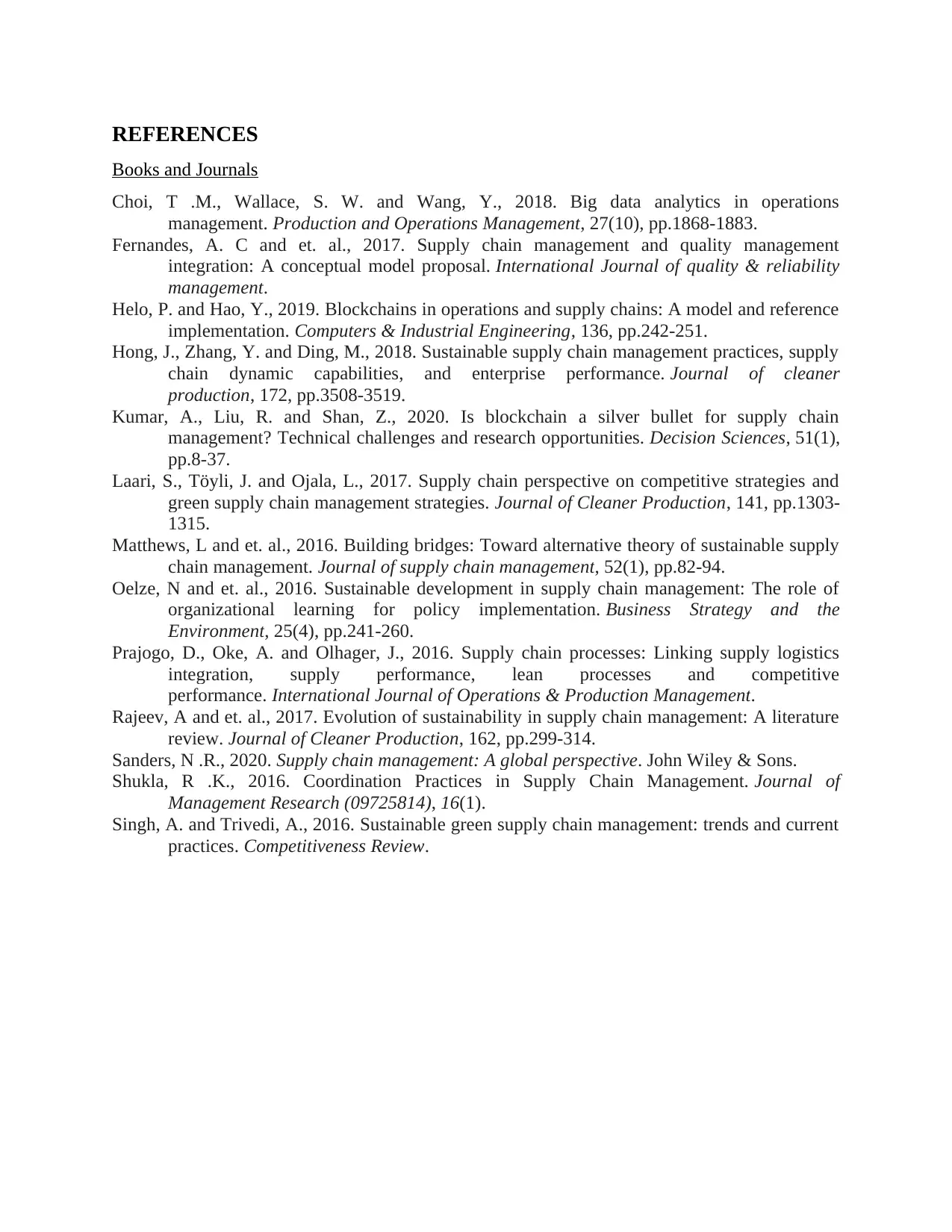
REFERENCES
Books and Journals
Choi, T .M., Wallace, S. W. and Wang, Y., 2018. Big data analytics in operations
management. Production and Operations Management, 27(10), pp.1868-1883.
Fernandes, A. C and et. al., 2017. Supply chain management and quality management
integration: A conceptual model proposal. International Journal of quality & reliability
management.
Helo, P. and Hao, Y., 2019. Blockchains in operations and supply chains: A model and reference
implementation. Computers & Industrial Engineering, 136, pp.242-251.
Hong, J., Zhang, Y. and Ding, M., 2018. Sustainable supply chain management practices, supply
chain dynamic capabilities, and enterprise performance. Journal of cleaner
production, 172, pp.3508-3519.
Kumar, A., Liu, R. and Shan, Z., 2020. Is blockchain a silver bullet for supply chain
management? Technical challenges and research opportunities. Decision Sciences, 51(1),
pp.8-37.
Laari, S., Töyli, J. and Ojala, L., 2017. Supply chain perspective on competitive strategies and
green supply chain management strategies. Journal of Cleaner Production, 141, pp.1303-
1315.
Matthews, L and et. al., 2016. Building bridges: Toward alternative theory of sustainable supply
chain management. Journal of supply chain management, 52(1), pp.82-94.
Oelze, N and et. al., 2016. Sustainable development in supply chain management: The role of
organizational learning for policy implementation. Business Strategy and the
Environment, 25(4), pp.241-260.
Prajogo, D., Oke, A. and Olhager, J., 2016. Supply chain processes: Linking supply logistics
integration, supply performance, lean processes and competitive
performance. International Journal of Operations & Production Management.
Rajeev, A and et. al., 2017. Evolution of sustainability in supply chain management: A literature
review. Journal of Cleaner Production, 162, pp.299-314.
Sanders, N .R., 2020. Supply chain management: A global perspective. John Wiley & Sons.
Shukla, R .K., 2016. Coordination Practices in Supply Chain Management. Journal of
Management Research (09725814), 16(1).
Singh, A. and Trivedi, A., 2016. Sustainable green supply chain management: trends and current
practices. Competitiveness Review.
Books and Journals
Choi, T .M., Wallace, S. W. and Wang, Y., 2018. Big data analytics in operations
management. Production and Operations Management, 27(10), pp.1868-1883.
Fernandes, A. C and et. al., 2017. Supply chain management and quality management
integration: A conceptual model proposal. International Journal of quality & reliability
management.
Helo, P. and Hao, Y., 2019. Blockchains in operations and supply chains: A model and reference
implementation. Computers & Industrial Engineering, 136, pp.242-251.
Hong, J., Zhang, Y. and Ding, M., 2018. Sustainable supply chain management practices, supply
chain dynamic capabilities, and enterprise performance. Journal of cleaner
production, 172, pp.3508-3519.
Kumar, A., Liu, R. and Shan, Z., 2020. Is blockchain a silver bullet for supply chain
management? Technical challenges and research opportunities. Decision Sciences, 51(1),
pp.8-37.
Laari, S., Töyli, J. and Ojala, L., 2017. Supply chain perspective on competitive strategies and
green supply chain management strategies. Journal of Cleaner Production, 141, pp.1303-
1315.
Matthews, L and et. al., 2016. Building bridges: Toward alternative theory of sustainable supply
chain management. Journal of supply chain management, 52(1), pp.82-94.
Oelze, N and et. al., 2016. Sustainable development in supply chain management: The role of
organizational learning for policy implementation. Business Strategy and the
Environment, 25(4), pp.241-260.
Prajogo, D., Oke, A. and Olhager, J., 2016. Supply chain processes: Linking supply logistics
integration, supply performance, lean processes and competitive
performance. International Journal of Operations & Production Management.
Rajeev, A and et. al., 2017. Evolution of sustainability in supply chain management: A literature
review. Journal of Cleaner Production, 162, pp.299-314.
Sanders, N .R., 2020. Supply chain management: A global perspective. John Wiley & Sons.
Shukla, R .K., 2016. Coordination Practices in Supply Chain Management. Journal of
Management Research (09725814), 16(1).
Singh, A. and Trivedi, A., 2016. Sustainable green supply chain management: trends and current
practices. Competitiveness Review.
1 out of 8
Related Documents
Your All-in-One AI-Powered Toolkit for Academic Success.
+13062052269
info@desklib.com
Available 24*7 on WhatsApp / Email
![[object Object]](/_next/static/media/star-bottom.7253800d.svg)
Unlock your academic potential
© 2024 | Zucol Services PVT LTD | All rights reserved.





